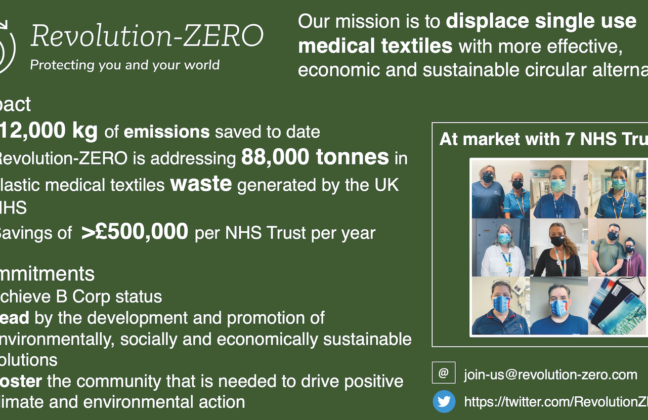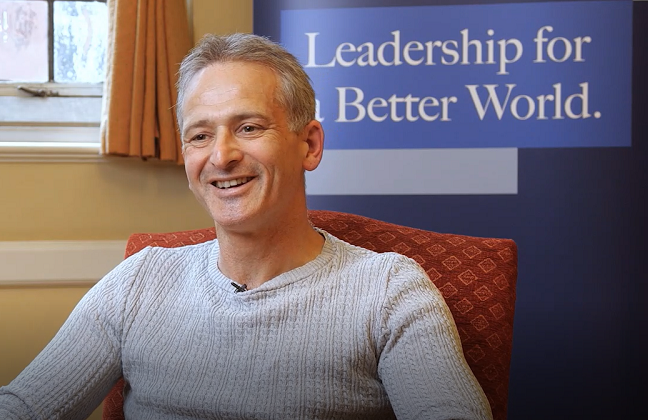Editorial: Tom Dawson (Revolution-ZERO) with Hannah Drew (Good Club) and Tom Struthers (Draught Drop) Contributors: The Reusables Working …
Extending Product Lifespans: Material Focus

Did you know that 11 million toasters are thrown away or hoarded each year?! That’s according to research conducted by Opinium for Material Focus’ Recycle Your Electrics campaign whose aim is to bring awareness to the e-waste problem caused by throwing away or hoarding old small electricals. As a nation of toast-lovers (apparently, we munch our way through 40 million slices a day!) it’s clear that we don’t love our toasters and other appliances quite as much, with an estimated 1.5 million tonnes of e-waste generated by the UK in 2017.
Recently, we spoke to Material Focus’ Executive Director, Scott Butler, about their mission to prevent e-waste and ensure electricals are reused and recycled instead.
How do you create value from the circular economy?
We’re part of a group of organisations working to promote what is the most compelling and important issue of our times; figuring out how we function as an economy in a way that is meaningful and mindful. E-waste is the fastest growing waste steam in the world, and tech is an ever more important and crucial part of our lives. We’re helping society, business and people appreciate the value in their tech and use it in a more productive fashion. Making sure that valuable resources are retained, to deliver a circular economy for good.
There’s lots of discussion about mindful consumption and a lot being done to promote donations, reuse, refurbishment etc., but we’re being very pragmatic, we want to see what we can do here and now. We want recycling to become the worst thing that people do with their waste, rather than something 30-40% that people do might do with the rest going to landfill. We don’t deal with smart devices, everybody is refurbing smart devices, what we’re interested in is the cheap kettle from Robert Dyas or that old Nokia charger that’s in your drawer. What we do need is behaviour change, there is a need for systems change for the general public rather than aiming for a mass understanding of CE. We need easy behaviour changes that the public can adopt.
What do you feel is the importance of extending the lifespan of products?
Electricals are made up of valuable resources, a lot of effort, energy and environmental impact goes into making products which are central to our lives. This hard work needs to be respected and one way is having long life and adaptable products. There is a possible danger of the tech industry falling into the same issues that have faced fast food and fast fashion, with fast tech seemingly becoming a thing. There is a risk of underappreciating the value in technology. To give a prime example, disposable vapes are a huge issue with resources used so wastefully and disrespectfully, feeding into this idea of fast tech. We need to be mindful of the mistakes made in the past with ‘fast’ industries.
What are the main challenges you’ve faced?
We’re trying to get all electricals recycled, with small electricals at the minimum so we’ve faced multiple challenges, but one of our biggest has been awareness raising and raising our profile. Over half the population don’t realise that electricals can be recycled. This paired with a very busy media and communications environment can make getting our message across difficult. We are competing with the biggest companies in the world, with the big tech companies, so getting consumers to recognise that they can recycle their electricals has been our biggest challenge. Even then, despite a high percentage of people being pro-recycling, when we do cut through it’s still too difficult for them to do. Therefore, we’re trying to make it more accessible to recycle, by speaking to local authorities, shopping centres etc. to raise awareness and increase ease. We’re confident that if it’s easier, then we can be successful. It’s a constant pushing of ongoing awareness raising, constantly reminding people and trying to make it the norm like paper or glass recycling. If it’s got a plug, battery or cable, then it can be recycled.
Can you tell us about any key successes?
We’ve had a lot of successes. To start with we’ve been growing consistently for 2 years, we launched in March 2020 (which was not a great time to be starting anything!) and since then well over 1 million people have visited and used our postcode locator (which allows people to find their nearest recycling point). We’ve funded multiple projects that have made it easier to access recycling, therefore making it easier for 1 million more people. We’ve had masses of positive mainstream media coverage across the country, including in huge publications. In the last 6 months we’ve definitely seen more inbound enquiries from big news sources, which is a big achievement.
Campaigns such as the Recycle Your Electrics’ Giant Toaster one, which gained big media attention, help to highlight the issues with linear consumption and encourage consumers to preserve the life of goods through reuse and repair, before disposing of them responsibly so that precious materials can be reclaimed. You can find out more about their work and access their postcode locator here.
As part of the CE-Hub’s work establishing a UK circular economy data observatory, we are drawing on a range of data and a toolkit of methods to help answer stakeholder questions. For instance, by linking open data on product lifespans and UK production and trade, we can approximate the current number of products in use ranging from toasters to mobile phones, annual levels of waste and associated losses of value and emissions. These same tools can also be used to help estimate the benefits of, for example, product lifespan extension such as for consumers in the forms of savings as well as waste prevention. Based on this work, we will be publishing a series of articles examining the potential economic and environmental benefits of extending the lifespan of products in the UK over the coming months, with the first of these ‘Lifespans and the Circular Economy’ published on our Knowledge Hub.






